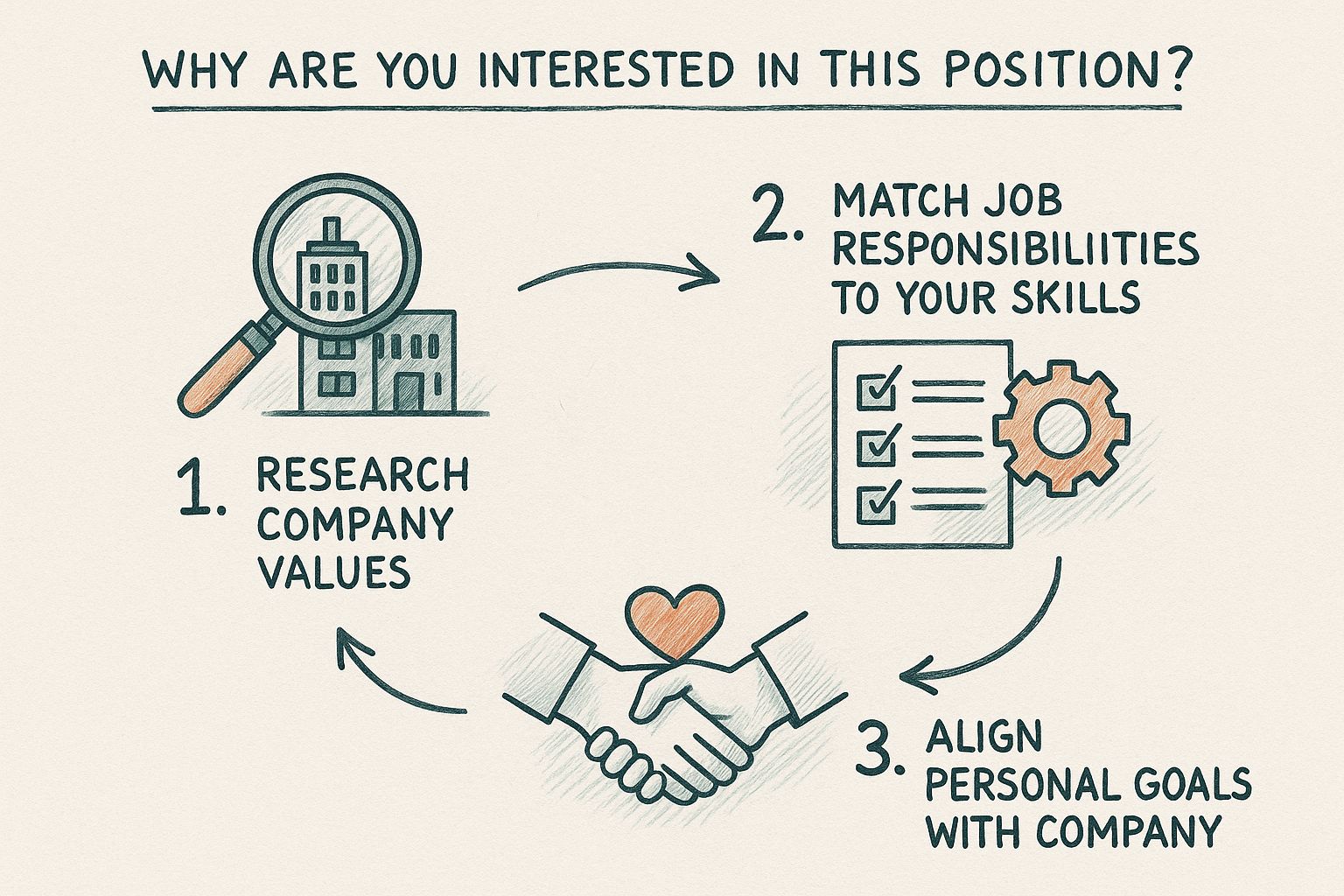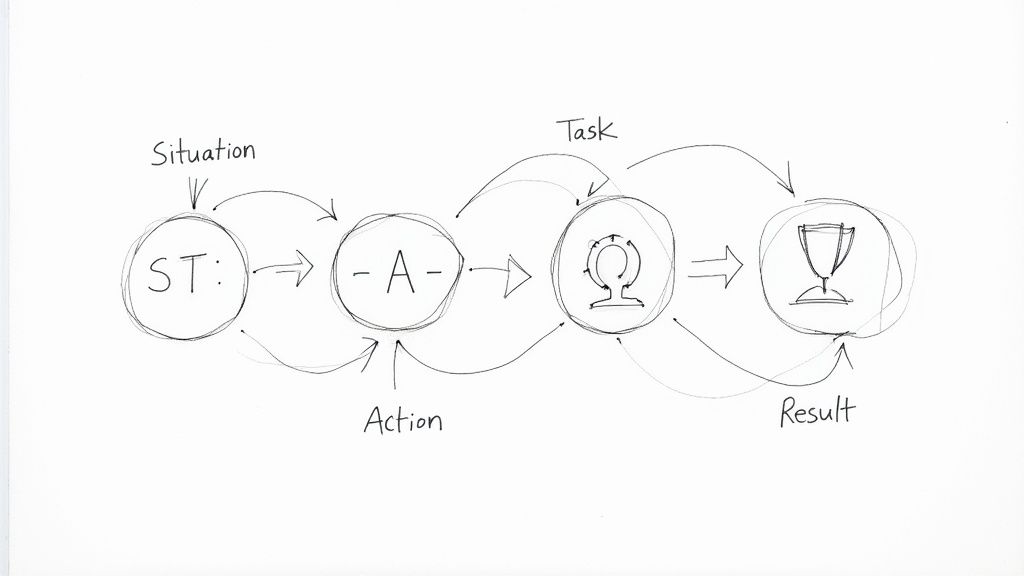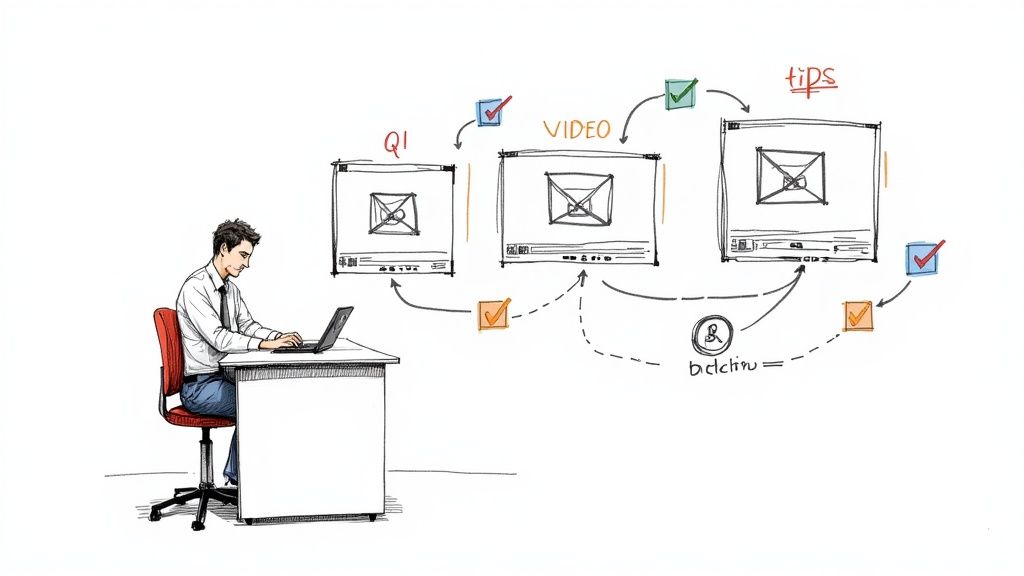Let's be honest. Early-stage screening is a soul-crushing time sink. You post a job, get a flood of applicants, and spend the next two weeks sifting through résumés that all claim 'excellent communication skills.' Then comes the phone screen, where you ask the same five questions 50 times, hoping for a spark of life. It’s enough to make you want to mortgage the office ping-pong table for an outsourced solution.
This is where asynchronous video interviews enter the chat. They promise efficiency, but there's a catch: they're only as good as the pre recorded interview questions you ask. Generic queries get you generic, pre-canned answers. You end up with a folder full of perfectly polished, utterly useless videos. Hope you enjoy fact-checking claims and running follow-up calls, because that’s now your full-time job.
I’ve been there. I’ve wasted countless hours reviewing videos that told me nothing. So, we stopped guessing and started testing. We've tweaked, failed, and finally landed on a set of questions that actually separate the contenders from the pretenders. These aren't your typical HR-manual questions; they're designed to reveal personality, problem-solving skills, and genuine interest, fast. If you're wondering why great candidates might not even be reaching this stage, exploring some common roadblocks to landing interviews can provide valuable insight.
Here are the 6 questions we swear by.
1. Tell me about yourself
Let's start with the classic, the OG, the question so common it’s practically a hiring ritual. You might think it's a softball, a gentle warm-up. In a pre-recorded interview, however, it’s a high-stakes test of a candidate’s ability to communicate clearly and concisely under pressure. No friendly interviewer nodding along, just a camera and a ticking clock.
This question isn't just a formality; it's a powerful diagnostic tool. It forces the candidate to distill their entire professional story into a compelling, 90-second pitch. Think of it as their professional trailer. How they structure their narrative, what they choose to highlight, and what they leave out tells you volumes about their self-awareness and alignment with the role.

Strategic Breakdown
For recruiters, this question is your first real data point on a candidate's communication skills and professional focus. It separates the prepared from the panicked. Major players like Amazon and McKinsey use this in their initial digital screens because it’s ruthlessly efficient at filtering for clarity and confidence.
A great response isn’t a life story. It’s a targeted summary that connects past experiences to the present opportunity and future ambitions. A candidate who rambles about their childhood hobbies has already failed the test. One who crisply presents their value proposition in the context of your company’s needs? They just jumped to the top of the pile. This is one of the most fundamental pre recorded interview questions because it sets the tone for the entire evaluation.
Key Insight: The "Tell me about yourself" question isn't about what the candidate has done, but how they frame it. You're assessing their ability to build a relevant narrative, a core skill for any role that requires influencing others, from sales to senior leadership.
Actionable Takeaways for Recruiters
To get the most out of this question, here’s how to guide candidates and evaluate responses:
- Set Clear Time Limits: Explicitly state the maximum response time (90-120 seconds is ideal). This tests their ability to be concise.
- Evaluate Structure: Look for the "Present-Past-Future" format. A strong candidate starts with their current role, connects it to relevant past experiences, and ties it all to why they want this specific job.
- Assess Professionalism: Are they making eye contact with the camera? Is their delivery polished but not robotic? These are proxies for how they’ll present themselves to clients or internal stakeholders.
- Provide Guidance: In your interview instructions, you can offer a brief tip like, "We'd love to hear a brief summary of your professional journey and what led you to apply for this role." This helps candidates focus. To get a deeper understanding of a candidate's perspective, explore our guide on mastering on-demand video interviews.
2. Why are you interested in this position/company?
This is the "prove you've done your homework" question. In a live setting, a candidate might charm their way through a generic answer. But in the quiet, reflective space of a pre-recorded interview, a canned response about your "great company culture" falls painfully flat. This is where you separate the genuinely invested from the mass-appliers.
This question is a litmus test for a candidate's motivation and research skills. It reveals if they see this role as just another job or as a deliberate next step in their career. Their answer tells you whether they understand your company's mission, challenges, and recent wins. A candidate who can’t articulate this isn’t just unprepared; they’re demonstrating a lack of genuine interest.
The following infographic outlines the ideal process a candidate should follow to craft a compelling answer, which in turn helps you evaluate the depth of their preparation.

This flow illustrates that a strong response is built on a foundation of research, self-assessment, and genuine alignment, not just surface-level flattery.
Strategic Breakdown
For recruiters, this question is a powerful filter for cultural fit and long-term potential. Companies with strong identities, like Google or Salesforce, lean heavily on this to find candidates who align with their core values and mission. A candidate who talks about Salesforce's "Ohana" culture or a non-profit's recent community initiative shows they've gone beyond the job description.
A stellar answer connects the dots between the company's trajectory and the candidate's personal and professional goals. They don't just say they're passionate; they show it by referencing a specific product launch, a recent article about the CEO, or a company value that resonates with them. This is one of the most insightful pre recorded interview questions because it uncovers a candidate's intrinsic motivation.
Key Insight: This question isn’t about flattery; it’s about alignment. You're looking for evidence that the candidate has thoughtfully considered how their skills and ambitions connect with your company's specific needs and direction.
Actionable Takeaways for Recruiters
To effectively screen for genuine interest and fit, use these tactics:
- Frame the Question Specifically: Instead of just "Why us?", try "What about our recent X project or our company mission excites you the most?" This forces a more detailed, researched response.
- Listen for Specifics: Did they mention a product, a value, a news story, or a team member? Vague praise is a red flag. Specifics show they’ve put in the effort.
- Assess Authenticity: Enthusiasm is easy to spot, even on video. Look for a tone and energy that suggest genuine excitement, not just a well-rehearsed script.
- Evaluate Value Alignment: The best candidates connect their personal values to your company's. If you’re a sustainability-focused brand, do they mention their passion for environmental causes? This indicates a deeper, more meaningful fit.
3. Describe a challenging situation you faced and how you handled it
This is the big one. The behavioral question designed to see if a candidate crumbles or conquers when things go sideways. In a live interview, you can probe and guide them. In a pre-recorded setting, it's a raw, unedited test of their storytelling ability, emotional intelligence, and problem-solving framework, all delivered to a silent camera.
This question strips away the polished resume points and forces candidates to demonstrate, not just claim, their competencies. It’s less about the problem they faced and more about the process they used to solve it. How they structure their answer reveals their ability to think logically under pressure and communicate a complex situation with clarity, which is mission-critical for almost any role.

Strategic Breakdown
For recruiters, this question is a goldmine of behavioral data. It helps you assess resilience, accountability, and strategic thinking in a single response. Companies like Deloitte and major healthcare organizations rely on this question in digital interviews to see how candidates navigate ambiguity and pressure, core skills for consulting and crisis management.
A top-tier answer follows the STAR method (Situation, Task, Action, Result) without sounding like a robot reading a script. The candidate sets the scene, defines their responsibility, details their specific actions, and-most importantly-quantifies the outcome. A candidate who blames others or focuses too much on the problem is a red flag. One who takes ownership and showcases learning has just proven their value. These types of pre recorded interview questions are designed to separate the talkers from the doers.
Key Insight: This question isn't about finding a candidate who has never failed. It's about finding one who knows how to handle failure. You’re looking for evidence of a growth mindset, ownership, and the ability to turn a challenging situation into a positive outcome.
Actionable Takeaways for Recruiters
To effectively evaluate responses to this question, use the following framework:
- Look for the STAR Method: Was the story structured logically? A great candidate will naturally guide you through the Situation, Task, Action, and Result without you having to ask for it.
- Focus on the "A" (Action): The most critical part is what the candidate did. Look for "I" statements, not "we" statements. What specific steps did they take?
- Demand Quantifiable Results: The best answers end with a clear, measurable outcome. Did they save the company money, improve a process by X%, or retain a key client? Numbers speak louder than words.
- Provide Context: In your instructions, you can prompt them: "Tell us about a specific professional challenge, detailing the steps you took and the measurable result." This encourages them to focus on ownership and impact. To better understand how to frame these prompts, explore our guide on tackling workplace issues with grace.
4. What are your greatest strengths and how do they apply to this role?
This question is the ultimate test of a candidate's self-awareness and ability to connect the dots. It’s not just a chance to brag; it's a strategic challenge. In a pre-recorded format, there's no interviewer to read the room or offer encouraging nods. The candidate is alone with their thoughts, a camera, and the need to deliver a response that’s confident but not arrogant, and specific but not rambling.
This question cuts through the fluff. It forces candidates to move beyond generic resume buzzwords and articulate exactly how their specific skills translate into value for your company. You're not just asking what they're good at; you're asking if they've done their homework and truly understand what the role demands.

Strategic Breakdown
For recruiters, this question is a powerful filter. It quickly separates candidates who have reflected on their abilities from those who just copied a list of adjectives from a "how to get a job" blog. Tech giants like IBM use this to gauge how a developer’s problem-solving skills align with complex projects, while sales teams use it to see if a candidate’s persuasive abilities are genuine or just a facade.
A strong answer is a one-two punch: a clearly stated strength followed immediately by a concrete example of that strength in action, all tied back to your job description. The candidate who says "I'm a great communicator" is forgettable. The one who says, "My strength is translating complex technical data for non-technical stakeholders, like when I created a weekly dashboard that reduced executive questions by 40%," is a contender. This is one of the most revealing pre recorded interview questions because it uncovers a candidate’s ability to build a business case for themselves.
Key Insight: This question isn't about the strength itself, but the evidence behind it. You're assessing a candidate's ability to substantiate their claims and demonstrate a clear understanding of how their talents solve your specific business problems.
Actionable Takeaways for Recruiters
To make this question as effective as possible, here's how to frame it and what to look for:
- Demand Specificity: In your instructions, prompt them to "Provide a specific example from a previous role that demonstrates one of your key strengths." This nudges them away from vague, cliché answers.
- Check for Role Alignment: The best candidates won't just list their strengths; they’ll explicitly mention keywords and responsibilities from your job description. Did they connect their project management skills to your need for a "deadline-driven leader"?
- Assess Confidence and Humility: Look for a balanced delivery. Are they confident in their abilities without sounding egotistical? This is a key indicator of emotional intelligence and how they might fit into a team dynamic.
- Listen for Quantifiable Results: The most impactful answers include metrics. A candidate who says they "improved efficiency" is fine, but one who says they "implemented a new workflow that cut project delivery times by 15%" is exceptional.
5. Where do you see yourself in 5 years?
Ah, the dreaded crystal ball question. This classic isn't about getting a legally binding five-year plan; it's a strategic probe into a candidate's ambition, realism, and long-term alignment with your company. In a pre-recorded setting, with no one to read for social cues, the answer becomes a raw, unfiltered look at their career aspirations.
This question separates the career-planners from the job-hoppers. You're not just hiring for a role; you're investing in a potential future leader, innovator, or key contributor. How a candidate answers reveals whether they see this job as a stepping stone to somewhere else or as a foundational part of their professional journey. It’s a gut check on their commitment and foresight.
Strategic Breakdown
For recruiters, this question is a powerful tool for forecasting a candidate's potential longevity and cultural fit. It helps you understand if their personal growth trajectory can be accommodated within your organization's structure. Major management consulting firms use this to spot future partners, while high-growth tech startups use it to gauge a candidate's desire to build and scale with them.
A great response demonstrates ambition that is both inspiring and grounded. They should envision growth in skills, responsibilities, and impact, not just a fancier title. A candidate who says "in your job" might sound clever, but one who details a plan for mastering their craft and taking on new challenges shows genuine drive. This is one of the most revealing pre recorded interview questions because it uncovers a candidate's core motivations.
Key Insight: This question isn't about predicting the future. It's about assessing a candidate's ability to plan, articulate professional goals, and connect those goals to the opportunity you're offering. You're looking for alignment, not a psychic.
Actionable Takeaways for Recruiters
To effectively use this question, you need to evaluate the substance behind the ambition:
- Look for Alignment: Does their five-year vision make sense within your company? If they describe a role that doesn't exist and can't be created, it’s a major red flag for retention.
- Assess Realism: A junior applicant expecting to be CEO in five years is likely naive. Look for a plan that shows a realistic understanding of career progression and a desire for meaningful skill development.
- Evaluate Growth Mindset: The best answers focus on learning and impact. Phrases like "I aim to be an expert in…" or "I hope to be leading projects that…" are far more compelling than just "I want to be a manager."
- Frame the Question Clearly: In your instructions, you can prompt them with, "Describe where you envision your career in five years and how this role can help you get there." This encourages them to connect their goals directly to your organization.
6. Why are you leaving your current position?
Ah, the transition question. This is where the interview gets real, fast. It’s a delicate dance between honesty and diplomacy, and in a pre-recorded format, there’s no room for a misstep. Without a live recruiter to read the room, the candidate’s answer is judged purely on its content, tone, and delivery. It’s a pressure cooker for professionalism.
This question is designed to uncover a candidate's motivations, self-awareness, and temperament. Are they running away from a bad situation, or are they running toward a better opportunity? The answer reveals whether they're a problem-solver who seeks growth or someone who blames others when things get tough. It's a surprisingly effective filter for high-drama candidates.
Strategic Breakdown
For recruiters, this question is a goldmine of information about a candidate’s resilience and career focus. Major corporate recruiting teams use this to screen for cultural red flags, while executive search firms see it as a critical test of a senior leader’s discretion. A candidate who launches into a tirade about their "terrible boss" or "toxic company" is showing you exactly how they’ll speak about your organization one day.
A strong answer is forward-looking and positive. It focuses on the pull of the new opportunity, not the push from the old one. The candidate should articulate a clear, compelling reason for their search that aligns with growth, learning, or taking on new challenges. This is one of the most revealing pre recorded interview questions because it tests emotional intelligence and professional maturity in a single, concise response.
Key Insight: This question isn't just about the "why." It's a test of a candidate's ability to frame their career narrative constructively. You're assessing their capacity for diplomacy and their genuine motivation for change, key indicators of a future-focused and positive team member.
Actionable Takeaways for Recruiters
To extract the most value from this question, guide candidates and evaluate their responses with a strategic lens:
- Look for the "Toward" Mentality: A great candidate will focus on what they are moving toward (e.g., "I'm seeking a role with more strategic responsibility, which this position offers") rather than what they are fleeing from.
- Probe for Specifics: In your prompt, ask candidates to "share what you are looking for in your next role and why this position aligns with that." This encourages them to connect their departure to their ambitions.
- Assess Their Tone: Is their delivery bitter and resentful, or is it optimistic and professional? The non-verbal cues in a video response are just as important as the words themselves.
- Provide Context: A candidate's preparation is key. You can help them frame their thinking by offering resources on how to best present their story. To learn more about how candidates can articulate their career moves, check out our guide on how to prepare for a video interview.
Pre-Recorded Interview Questions Comparison
| Question Title | Implementation Complexity 🔄 | Resource Requirements 💡 | Expected Outcomes 📊 | Ideal Use Cases 💡 | Key Advantages ⭐ |
|---|---|---|---|---|---|
| Tell me about yourself | Low 🔄 | Minimal (candidate prep) 💡 | Insight into communication & self-awareness 📊 | General screening, all industries 💡 | Easy to compare responses; reveals personality ⭐ |
| Why are you interested in this position/company? | Medium 🔄 | Extensive company & role research required 💡 | Assesses motivation & cultural fit 📊 | Companies valuing cultural fit & passion 💡 | Identifies genuine interest; shows prep level ⭐ |
| Describe a challenging situation you faced and how you handled it | Medium-High 🔄 | Candidate prep for STAR examples 💡 | Reveals problem-solving & resilience skills 📊 | Consulting, healthcare, project management 💡 | Provides concrete competency examples ⭐ |
| What are your greatest strengths and how do they apply to this role? | Low-Medium 🔄 | Moderate prep to select relevant strengths 💡 | Measures self-awareness & role fit 📊 | Technical roles, sales, leadership dev 💡 | Highlights key qualities; gauges confidence ⭐ |
| Where do you see yourself in 5 years? | Low 🔄 | Minimal prep focused on career planning 💡 | Assesses ambition & growth mindset 📊 | Succession planning, growth-focused firms 💡 | Reveals long-term potential & goals ⭐ |
| Why are you leaving your current position? | Low 🔄 | Minimal prep; focus on diplomacy 💡 | Tests professionalism & motivation 📊 | Transition roles, senior hires, startups 💡 | Provides insight into motivations; flags concerns ⭐ |
Stop Screening, Start Interviewing
Let’s be honest. The traditional phone screen is broken. It’s a low-yield, time-sucking ritual that forces you to ask the same six questions fifty times, hoping one of the answers stands out. We’ve walked through the classics: "Tell me about yourself," "Why this company?", the dreaded "Where do you see yourself in 5 years?" and others. The goal was to show that these aren't just checkbox questions; they are powerful diagnostic tools when framed correctly in a pre-recorded format.
The big takeaway here is that the right pre recorded interview questions transform your initial screening from a passive filter into an active intelligence-gathering operation. You're not just confirming what's on a resume; you're stress-testing communication skills, assessing cultural alignment, and gauging genuine motivation before you ever commit to a live conversation. This isn't about saving five minutes on a phone call. It’s about reallocating dozens of hours from repetitive screening to high-impact conversations with your top contenders.
The Real Shift: From Gatekeeper to Talent Scout
Mastering this isn't just a process improvement, it’s a strategic advantage. While your competitors are stuck in scheduling hell, you’re already evaluating a candidate’s thoughtful response to a behavioral question. You gain a deeper, more authentic first impression, and you give every candidate a fair shot to make their case, regardless of their time zone or work schedule.
To get the most out of this process, it’s crucial to structure your approach with clarity and purpose. Incorporating a few simple but effective tips for remote job interview questions can make a significant difference in the quality of responses you receive and how accurately you can evaluate them. This mindset shift-from gatekeeper to talent scout-is what separates good hiring teams from great ones. You stop asking "Do they meet the minimum criteria?" and start asking "Does this person have the potential to be a star here?"
The value is clear: better data, faster decisions, and a more equitable process that uncovers hidden gems. You move from a system that favors the best resume-writer to one that favors the best thinker, problem-solver, and communicator. Stop wasting your most valuable resource, your time, on logistics. It’s time to stop screening and start interviewing.
Ready to reclaim your calendar and build a smarter hiring funnel? Async Interview gives you the tools to ask better pre recorded interview questions and easily find the answers that matter. Ditch the phone screens and start identifying top talent in a fraction of the time.





